I’ve seen quite a few comments lately expressing negativity about Morocco, many of which being quite harsh and misinformed. It’s disheartening to see how many people have decided to change their travel plans based on such negative portrayals.
As someone who loves Morocco and has spent time exploring this incredible country, I want to offer a different perspective. Morocco is a developing nation, and yes, poverty and desperation are visible in many areas. The impact of COVID-19 has only made things harder for the people there. But despite these challenges, the warmth and resilience of the Moroccan people shine through.
If you’re planning a trip to Morocco and have booked a nice hotel or a tour guide, your experience will likely be smooth. However, if you’re like me and prefer to explore on your own, be prepared for the reality of navigating a bustling, vibrant country with a rich cultural and religious heritage. A little preparation goes a long way in understanding what to expect, especially when arriving in a city like Marrakech.
Marrakech is enchanting but also bustling with activity, and yes, you will encounter people trying to sell you things or offer services. This can be overwhelming, especially if you’re not used to it. After spending some time in Marrakech, I decided to explore the coast and travel south, where I found less touristy spots and had some of the best experiences of my life.
During my travels, I met incredible people and enjoyed delicious local dishes. In Marrakech, I highly recommend dining at Al Fassia, where I tried the lamb tagine with prunes—simply unforgettable. In the coastal town of Essaouira, Restaurant La Table by Madada served the freshest seafood tagine I’ve ever had. For a more luxurious stay, consider Riad El Fenn in Marrakech, which combines traditional Moroccan architecture with modern comfort.
For those interested in nightlife and relaxing with a hookah, Marrakech has some great spots like Le Salama, where you can enjoy a rooftop view of the city while smoking shisha and sipping mint tea. Another great place is Comptoir Darna, known for its vibrant atmosphere, belly dancing, and excellent cocktails.
Navigating Morocco requires some savvy. For instance, always agree on taxi fares before getting in, and don’t be afraid to be firm if someone tries to overcharge you. I remember a taxi driver trying to double the fare we had agreed upon, but because I stood my ground, he backed down. It’s important to be assertive, not just to protect your wallet but to show that you respect yourself and the people you’re dealing with.
If you haven’t broken any laws, know that the police and locals will generally be on your side if someone is harassing you. Tourism is vital to Morocco’s economy—contributing around nine billion U.S. dollars to the GDP in 2021—so the authorities and locals are keen to ensure tourists have a positive experience.
Morocco is a country of over 37 million people, each with their own story and struggles. It’s easy to criticize from afar, but it’s important to approach the country with an open mind and heart. My time in Morocco was made richer by the kindness of strangers. One memorable incident involved two Moroccans who saved my life when I went into anaphylactic shock after eating a pastry that had nuts. They carried me to the nearest taxi and got me to a hospital, showing the kind of generosity and compassion that often goes unnoticed.
So, if you’re considering a trip to Morocco, go with respect, patience, and a sense of adventure. You might find, like I did, that the experience is far more rewarding than you ever imagined.


